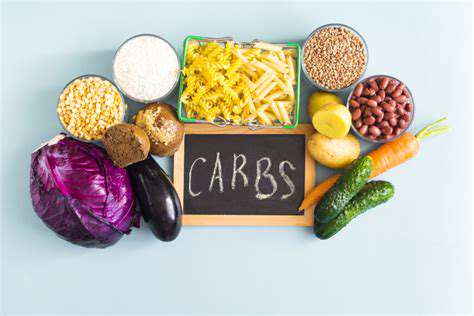Low Calorie Meals for Dinner: Healthy & Satisfying
Sep 01, 2025 / btwgardenmachine/
Smart Carbohydrate Choices

Understanding the Importance of Smart Carbohydrate Choices
Carbohydrates are essential for providing energy to our bodies, but not all carbohydrates are created equal. Choosing smart carbohydrates, or complex carbohydrates, over simple carbohydrates is crucial for sustained energy levels and overall health. Simple carbohydrates, like those found in sugary drinks and processed foods, are quickly digested, leading to a rapid spike in blood sugar and a subsequent crash. This can cause energy fluctuations, mood swings, and even contribute to weight gain.
Fiber: The Unsung Hero of Carbohydrate Choices
Dietary fiber is a type of complex carbohydrate that our bodies can't digest. It plays a vital role in maintaining healthy digestion, promoting satiety, and regulating blood sugar levels. Fiber-rich foods, such as fruits, vegetables, and whole grains, contribute to a feeling of fullness, preventing overeating and aiding in weight management. They also help keep the digestive system running smoothly, reducing the risk of constipation and promoting regularity.
The Role of Whole Grains in a Balanced Diet
Whole grains are a fantastic source of complex carbohydrates, fiber, and essential nutrients. Choosing whole grains over refined grains provides a sustained release of energy, promoting stable blood sugar levels and preventing energy crashes. Whole grains, such as brown rice, quinoa, and oats, are packed with vitamins, minerals, and antioxidants, contributing to overall well-being and supporting a healthy immune system. They also offer a wide range of nutrients that refined grains often lack.
Balancing Carbohydrates with Protein and Healthy Fats
Carbohydrates are not the only macronutrients our bodies need. A balanced diet includes a combination of carbohydrates, proteins, and healthy fats. Protein helps with muscle repair and growth, while healthy fats are crucial for hormone production and overall bodily functions. Properly balancing these macronutrients is key for optimal health and energy levels. By incorporating lean proteins and healthy fats alongside smart carbohydrate choices, you can create meals that provide sustained energy without blood sugar fluctuations.
Smart Carbohydrate Choices for Specific Needs
Individual needs for carbohydrates can vary depending on factors such as activity level, health conditions, and personal preferences. For athletes, a higher intake of complex carbohydrates may be necessary to fuel intense workouts. Conversely, individuals with certain health conditions, such as diabetes, may need to carefully monitor their carbohydrate intake and choose options that help regulate blood sugar. Consulting a registered dietitian or healthcare professional can provide personalized guidance on smart carbohydrate choices to meet individual needs and health goals. This personalized approach ensures that your choices align with your specific requirements.
Healthy Fats for Flavor and Satiety
Choosing Healthy Fats
Incorporating healthy fats into your low-calorie dinner meals is crucial for flavor and satiety, helping you feel full and satisfied without overindulging. These fats play a vital role in nutrient absorption, hormone production, and overall bodily functions. Opting for healthy fats over unhealthy ones is essential for maintaining a balanced diet and supporting your well-being.
Understanding which fats are healthy and how to incorporate them into your meals is key to achieving your weight management goals. A balanced approach to fat consumption, alongside a focus on lean proteins and complex carbohydrates, can lead to more satisfying and nutritious dinners.
Monounsaturated Fats
Monounsaturated fats, found in avocados, olive oil, and nuts, are excellent sources of healthy fats. These fats help lower LDL (bad) cholesterol levels while maintaining healthy HDL (good) cholesterol levels. Using olive oil for sautéing vegetables or drizzling over salads can add delicious flavor without adding excessive calories.
Incorporating avocado into your dinner preparations, such as in a salad or as a topping for grilled fish, can provide a creamy texture and a satisfying richness. Remember to use these fats in moderation, as they are still high in calories.
Polyunsaturated Fats
Polyunsaturated fats, including omega-3 and omega-6 fatty acids, are essential for various bodily functions. Omega-3s, found in fatty fish like salmon and tuna, are particularly beneficial for heart health and brain function. Including a serving of fatty fish in your low-calorie dinner can provide these vital nutrients.
The Role of Fats in Satiety
Healthy fats play a crucial role in promoting satiety, helping you feel full and satisfied after a meal. This is because fats take longer to digest than carbohydrates or proteins, leading to a sustained feeling of fullness. By incorporating healthy fats into your dinner, you can minimize the likelihood of overeating and promote better portion control.
Fat Sources in Healthy Dinner Options
Many healthy dinner options naturally incorporate healthy fats. For instance, a grilled chicken salad with avocado and a light vinaigrette dressing provides a delicious and satisfying meal. Similarly, baked salmon with roasted vegetables and a drizzle of olive oil offers a balanced combination of healthy fats and nutrients.
Portion Control and Healthy Fats
While healthy fats are essential, it's crucial to be mindful of portion sizes. Even healthy fats contain calories, and excessive consumption can contribute to weight gain. Using a measuring spoon or scale can help you accurately portion out healthy fats, ensuring that you're not overdoing it. Careful consideration of portion sizes is key to maintaining a balanced diet and achieving your health goals.
Balancing Fats with Other Nutrients
To maximize the benefits of healthy fats, it's important to incorporate them into a balanced dinner that also includes lean proteins and complex carbohydrates. A well-rounded meal provides a complete nutrient profile, promoting satiety and supporting your overall health. Consider pairing healthy fats with lean protein sources like grilled chicken or fish and fiber-rich vegetables for a complete and satisfying meal.